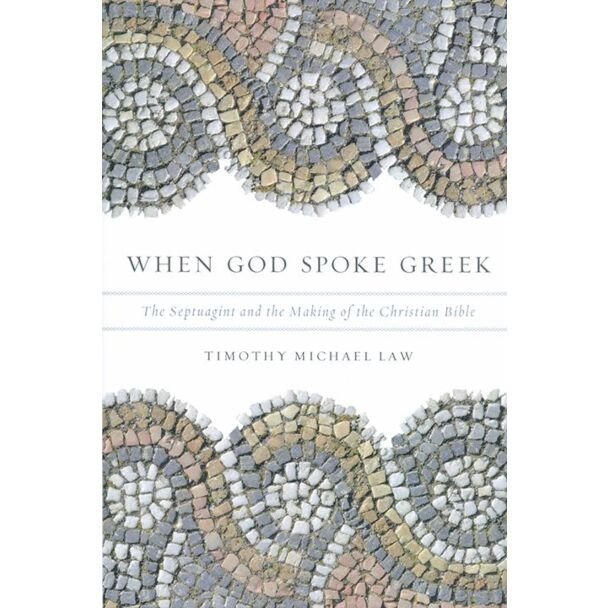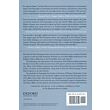When God Spoke Greek: The Septuagint and the Making of the Christian Bible
Timothy Michael Law
Publication Data: New York, NY: Oxford University Press, 2013
Format: softcover
Number of Pages: xii + 216
Dimensions (l × w × h): 23.4 cm × 15.6 cm × 1.6 cm
ISBN: 978‒0‒19‒978172‒0
Timothy Michael Law
“You have probably encountered the Septuagint already. You may never have heard of it, but the Septuagint will have made its way to you if you have read or so much as glanced at a Bible. [...]Apart from the numerous quotations of the Old Testament in the New, which were almost entirely from the Greek, the language and theology of the New Testament writers are indebted far more to the Septuagint than to the Hebrew Bible. Consequently, the Septuagint plays a critical role in the history of Christian theology and exegesis. [...T]he Septuagint remains foreign to most, including biblical scholars, indeed even Old Testament scholars. [...]English versions often treat the Septuagint as the stepchild of the received Hebrew Bible and reference the Greek only whenever something appears to have gone wrong in the transmission of the Hebrew text. Some continue to explain the radical divergences between the Septuagint and the Hebrew Bible as evidence that the Greek translators used nonstandard, or non-canonical, forms of the Hebrew, even though we know a canonical Hebrew Bible did not exist until several centuries after the Septuagint was translated. There are modern theological biases that keep the Septuagint at bay. [...]The prejudice in the contemporary Church in favor of the rabbinic Hebrew Bible is startling, but not unexpected given that Christian educational institutions teach future scholars and clergy the Old Testament exclusively from the Hebrew Bible, relegating the Septuagint to the sidelines of an upper-level elective course. Students thus graduate from schools that teach Christian history and theology without ever considering that the scriptures used by the New Testament writers and the first Old Testament of the Church is not the Hebrew Bible they spent time and money to study.”
—“1: Why This Book?”
CONTENTS
Acknowledgments
1. Why This Book?
2. When the World Became Greek
3. Was There a Bible before the Bible?
4. The First Bible Translators
5. Gog and His Not-So-Merry Grasshoppers
6. Bird Droppings, Stoned Elephants, and Exploding Dragons
7. E Pluribus Unum
8. The Septuagint behind the New Testament
9. The Septuagint in the New Testament
10. The New Old Testament
11. God’s Word for the Church
12. The Man of Steel and the Man Who Worshipped the Sun
13. The Man with the Burning Hand versus the Man with the Honeyed Sword
14. A Postscript
Notes
Further Reading
Index
Format: softcover
Number of Pages: xii + 216
Dimensions (l × w × h): 23.4 cm × 15.6 cm × 1.6 cm
ISBN: 978‒0‒19‒978172‒0
Timothy Michael Law
“You have probably encountered the Septuagint already. You may never have heard of it, but the Septuagint will have made its way to you if you have read or so much as glanced at a Bible. [...]Apart from the numerous quotations of the Old Testament in the New, which were almost entirely from the Greek, the language and theology of the New Testament writers are indebted far more to the Septuagint than to the Hebrew Bible. Consequently, the Septuagint plays a critical role in the history of Christian theology and exegesis. [...T]he Septuagint remains foreign to most, including biblical scholars, indeed even Old Testament scholars. [...]English versions often treat the Septuagint as the stepchild of the received Hebrew Bible and reference the Greek only whenever something appears to have gone wrong in the transmission of the Hebrew text. Some continue to explain the radical divergences between the Septuagint and the Hebrew Bible as evidence that the Greek translators used nonstandard, or non-canonical, forms of the Hebrew, even though we know a canonical Hebrew Bible did not exist until several centuries after the Septuagint was translated. There are modern theological biases that keep the Septuagint at bay. [...]The prejudice in the contemporary Church in favor of the rabbinic Hebrew Bible is startling, but not unexpected given that Christian educational institutions teach future scholars and clergy the Old Testament exclusively from the Hebrew Bible, relegating the Septuagint to the sidelines of an upper-level elective course. Students thus graduate from schools that teach Christian history and theology without ever considering that the scriptures used by the New Testament writers and the first Old Testament of the Church is not the Hebrew Bible they spent time and money to study.”
—“1: Why This Book?”
CONTENTS
Acknowledgments
1. Why This Book?
2. When the World Became Greek
3. Was There a Bible before the Bible?
4. The First Bible Translators
5. Gog and His Not-So-Merry Grasshoppers
6. Bird Droppings, Stoned Elephants, and Exploding Dragons
7. E Pluribus Unum
8. The Septuagint behind the New Testament
9. The Septuagint in the New Testament
10. The New Old Testament
11. God’s Word for the Church
12. The Man of Steel and the Man Who Worshipped the Sun
13. The Man with the Burning Hand versus the Man with the Honeyed Sword
14. A Postscript
Notes
Further Reading
Index
Write Your Own Review






